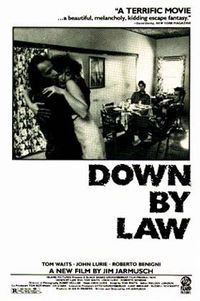Jarmusch B-day month post 3: Ordinary existence is enough, Boston Globe article from Down By Law period
 January is Jim Jarmusch's birthday month so much of my blogging this month will be regarding the director and his films. I am encouraging other bloggers to join me in the festivities the week of Jarmusch's b-day - the week that contains Jan. 22 - and blog something about Jarmusch - so that an old fashioned Blog-a-Thon may happen. This is my post #3 re: Jarmusch this month. See post 2 and post 1 by scrolling down.
January is Jim Jarmusch's birthday month so much of my blogging this month will be regarding the director and his films. I am encouraging other bloggers to join me in the festivities the week of Jarmusch's b-day - the week that contains Jan. 22 - and blog something about Jarmusch - so that an old fashioned Blog-a-Thon may happen. This is my post #3 re: Jarmusch this month. See post 2 and post 1 by scrolling down.Ordinary Existence Is Enough
What is the subtext of Jarmusch movies (specially the earliest one to contain his mature style - Stranger Than Paradise)? What relatively invisible thing draws the fans back over and over to Jarmusch's movies. I say relatively invisible because usually not much happens in a typical film fashion in Jarmush movies. Even far less than in Seinfeld, a show famous for being a show "about nothing". One attractive thing might be the fact that Jarmusch movies - specially Stranger Than Paradise and Mystery Train, also Night On Earth to a certain degree, makes ordinary existence, the in-between, rushed through, quickly forgotten moments that make up much of most of our days, sacred. The message delivered by American television and most American movies & media is that those who are successful and wealthy and are the powerful people in society or are celebrities are living a better life then you, but there are a few things we can sell you to make your life like theirs - to make your life better. But a movie like Stranger Than Paradise says the opposite: interesting things happen to completely un-interesting (by mainstream media standards) people, and that ordinary existence is enough, or that it may even be plenty. This quality that I attribute to Jarmusch movies is something that keeps bringing me back to his work. I believe that there are many among his fans who might share my view. In a victory worshiping, wealth worshipping nation/culture (not that there is anything wrong with that, i'd much rather live in a place obsessed with victory and wealth instead of loss/death/the glorious past and poverty) Jarmusch movies offers a break - a chance to catch my breath.
Boston Globe Article
A segment from a Boston Globe article, about Jarmusch's life around 1986, the year of Down By Law's (link to an Amazon page for Criterion's DVD, check out the New Orleans/Katrina related comment in Customers Reviews, btw - that Criterion DVD of the flick is excellent - lots of cool extras),(IMDB) release:
"Although Jarmusch has been, uh, visible, since the success of "Stranger Than Paradise," he doesn't like to think it's changed him much. At 33, the prematurely gray filmmaker from Akron by way of Columbia University still dresses in New Wave black, still remains close to the New Wave music scene, although the group with which he played, the Del-Byzanteens, has dissolved. When he won the Camera d'or award at Cannes in 1984, the prize was an actual camera, valued at $25,000. It sat in US Customs for months because Jarmusch didn't have the $2,000 he needed to pay the duty. He's since ransomed the camera."
Read the rest of the article here.
- Sujewa